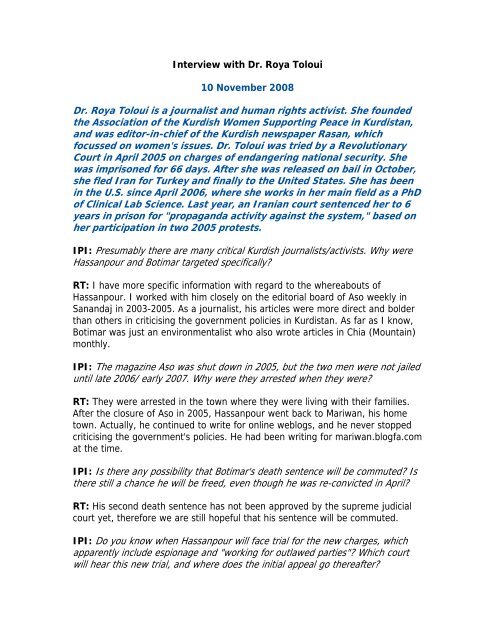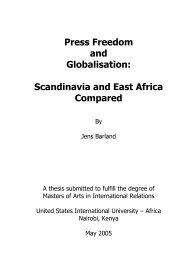Interview with Dr. Roya Toloui
Interview with Dr. Roya Toloui
Interview with Dr. Roya Toloui
You also want an ePaper? Increase the reach of your titles
YUMPU automatically turns print PDFs into web optimized ePapers that Google loves.
<strong>Interview</strong> <strong>with</strong> <strong>Dr</strong>. <strong>Roya</strong> <strong>Toloui</strong><br />
10 November 2008<br />
<strong>Dr</strong>. <strong>Roya</strong> <strong>Toloui</strong> is a journalist and human rights activist. She founded<br />
the Association of the Kurdish Women Supporting Peace in Kurdistan,<br />
and was editor-in-chief of the Kurdish newspaper Rasan, which<br />
focussed on women's issues. <strong>Dr</strong>. <strong>Toloui</strong> was tried by a Revolutionary<br />
Court in April 2005 on charges of endangering national security. She<br />
was imprisoned for 66 days. After she was released on bail in October,<br />
she fled Iran for Turkey and finally to the United States. She has been<br />
in the U.S. since April 2006, where she works in her main field as a PhD<br />
of Clinical Lab Science. Last year, an Iranian court sentenced her to 6<br />
years in prison for "propaganda activity against the system," based on<br />
her participation in two 2005 protests.<br />
IPI: Presumably there are many critical Kurdish journalists/activists. Why were<br />
Hassanpour and Botimar targeted specifically?<br />
RT: I have more specific information <strong>with</strong> regard to the whereabouts of<br />
Hassanpour. I worked <strong>with</strong> him closely on the editorial board of Aso weekly in<br />
Sanandaj in 2003-2005. As a journalist, his articles were more direct and bolder<br />
than others in criticising the government policies in Kurdistan. As far as I know,<br />
Botimar was just an environmentalist who also wrote articles in Chia (Mountain)<br />
monthly.<br />
IPI: The magazine Aso was shut down in 2005, but the two men were not jailed<br />
until late 2006/ early 2007. Why were they arrested when they were?<br />
RT: They were arrested in the town where they were living <strong>with</strong> their families.<br />
After the closure of Aso in 2005, Hassanpour went back to Mariwan, his home<br />
town. Actually, he continued to write for online weblogs, and he never stopped<br />
criticising the government's policies. He had been writing for mariwan.blogfa.com<br />
at the time.<br />
IPI: Is there any possibility that Botimar's death sentence will be commuted? Is<br />
there still a chance he will be freed, even though he was re-convicted in April?<br />
RT: His second death sentence has not been approved by the supreme judicial<br />
court yet, therefore we are still hopeful that his sentence will be commuted.<br />
IPI: Do you know when Hassanpour will face trial for the new charges, which<br />
apparently include espionage and "working for outlawed parties"? Which court<br />
will hear this new trial, and where does the initial appeal go thereafter?
RT: There have not been any new charges against him; he is being retried for<br />
previous charges. His trial will be conducted at a similar court. The appellate<br />
court seemed to change his conviction.<br />
IPI: Do you think that the appellate courts are more "trustworthy" than the<br />
original revolutionary court?<br />
RT: No, in my opinion no court in Iran is trustworthy.<br />
IPI: How well-publicized are the Hassanpour/Botimar cases <strong>with</strong>in Iran? Within<br />
Kurdistan?<br />
RT: We succeeded in mobilizing international, Iranian and Kurdish public opinion<br />
and attention to the unfairness of the charges against them and the sentences<br />
imposed on them. We also succeeded in neutralizing government efforts to scare<br />
off Kurdish civil activists and journalists. We hope they are released safe and<br />
sound to their families soon.<br />
IPI: How were these "government efforts" neutralized?<br />
RT: We publicized his case worldwide and, as a result, many human rights<br />
organizations such as Amnesty International and Human Rights Watch<br />
condemned the Iranian court's decision.<br />
IPI: Is the Kurdish community in Iran more vocal now than before? If so, is<br />
Hassanpour's case unique among Kurdish journalists?<br />
RT: Yes, Kurds are more vocal in demanding their rights. Hassanpour's case is<br />
not unique any more, since many others were arrested after him.<br />
IPI: Under what conditions are Hassapour and Botimar being held? Are you<br />
concerned that they are being ill-treated or tortured?<br />
RT: They are being held in unsatisfactory conditions. A statement about their<br />
complaints was even published on some Kurdish websites a while back. Yes, I<br />
am concerned about their safety because various forms of torture are quite<br />
common for Kurdish prisoners in Iran.
















